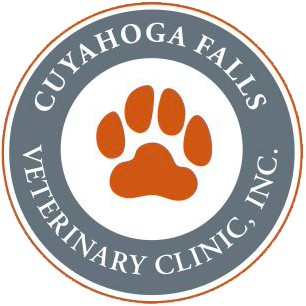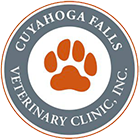Taking good care of our senior patients is a top priority at the Cuyahoga Falls Veterinary Clinic. We’ve touched on a number of senior-related issues in previous blog posts (such as Silver Screen: For Your Senior Pet’s Health).
The following article appeared in fetch! Magazine not that long ago. Because it fits with our philosophy of geriatric medicine, we would like to share it here in the second of three parts. Picking up where we left off with Part 1…
LESS FOOD EQUALS LONGER LIFE
Less is more when it comes to a long, healthy life. In a benchmark study, researchers found that Labrador Retrievers fed 25% less food than the normal guidelines lived about two years longer than those fed the “normal” amount.More surprisingly, they found that 77% of the “normal” Labs developed radiographic evidence of arthritis at age eight compared to only 10% of the calorie-restricted dogs. And 38% of the calorie-restricted dogs were still living after all the regular-diet dogs had passed.  This study concluded that dogs fed fewer calories lived longer and had fewer health problems.
This study concluded that dogs fed fewer calories lived longer and had fewer health problems.
Do your pet a favor and trade the treats for extra playtime. You just may add high-quality years to both of your lives.
SUBTLE CAN BE SIGNIFICANT
If you share your home with an older pet, never ignore that tiny voice telling you “something isn’t right.” If you suspect something — anything — is wrong with a pet over age seven, have it checked out.
Recently, I saw a 12-year-old dog that “hadn’t been feeling well for the past couple of weeks.” Sadly, by the time the owners finally listened to that inner voice, it was too late. Their dog was now bleeding internally from a ruptured splenic cancer. Emergency blood transfusions and surgery failed to save this dog’s life.
While I don’t fault the owners — there was nothing obviously wrong with their pet and they loved him dearly — I can’t help but be nagged by “what if?” What if I’d been able to diagnose the tumor before it ruptured? What if I’d performed surgery before it had lost over half its blood volume? I’ll never know, but I can be more diligent in telling my clients not to ignore even the most seemingly insignificant signs. The best news you can ever hear is, “It’s nothing to worry about.”
Written by Dr. Ernie Ward
Originally written for fetch! magazine, a Petplan pet insurance magazine. Learn more about Petplan at www.gopetplan.com
Reproduced with permission from the author and editor.
Great advice from Dr. Ward this week! The study that he referred to above has been nothing short of monumental in our understanding of feeding and the role of body condition in the health of our pets. And we’ve got our own stories about pets that only showed very subtle signs of serious underlying disease for a while. At the same time, though, we could share stories of owners who acted well before most would have even suspected a problem, and their pets’ diseases were diagnosed and treated with great success. Like Dr. Ward said, never ignore your sense that something may not be right.
Stay tuned for Part 3 of Seven Rules for the Over Seven Set, coming soon to a Cuyahoga Falls Veterinary Clinic Blog near you!


The Cuyahoga Falls Veterinary Clinic | Animal Wellness | Medical Services | Pet Services
[…] Seven Rules for the Over Seven Set, Pt. 2 […]
The Cuyahoga Falls Veterinary Clinic | Animal Wellness | Medical Services | Pet Services
[…] tuned for Part 2 of Seven Rules for the Over Seven Set, coming soon to a Cuyahoga Falls Veterinary Clinic Blog near […]